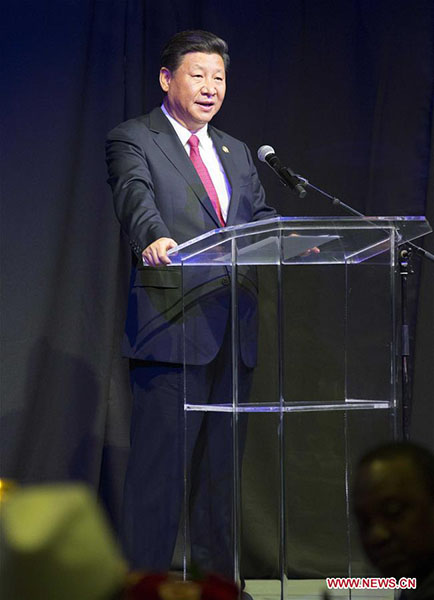Xi announces 10 major programs to boost China-Africa cooperation in coming 3 years
(Xinhua) Updated: 2015-12-04 16:42
 |
|
President Xi Jinping delivers a speech during a welcome banquet for the summit of the Forum on China-Africa Cooperation in Johannesburg, South Africa, Dec 3, 2015. [Photo/Xinhua] |
JOHANNESBURG -- Chinese President Xi Jinping announced here Friday that his country will roll out 10 major plans to boost cooperation with Africa in the coming three years.
Proposing to lift the China-Africa relationship to a comprehensive strategic cooperative partnership in a keynote speech at the opening ceremony of the second summit of the Forum on China-Africa Cooperation (FOCAC), Xi said the programs are aimed at carrying out the upgrade.
The big package covers the areas of industrialization, agricultural modernization, infrastructure, financial services, green development, trade and investment facilitation, poverty reduction and public welfare, public health, people-to-people exchanges, and peace and security.
To ensure smooth implementation of the initiatives, Xi announced, China will offer 60 billion US dollars of funding support, including 5 billion dollars of free aid and interest-free loans, 35 billion dollars of preferential loans and export credit on more favorable terms, 5 billion dollars of additional capital for the China-Africa Development Fund and the Special Loan for the Development of African SMEs each, and a China-Africa production capacity cooperation fund with the initial capital of 10 billion dollars.
"China-Africa relations have today reached a stage of growth unmatched in history," Xi said. "Let's join hands ... and open a new era of China-Africa win-win cooperation and common development."
The programs, stressed the president, will focus on helping African countries break the three development bottlenecks of backward infrastructure, talent shortage and inadequate fund, accelerate industrialization and agricultural modernization, and realize independent and sustainable development.
As regards the lack of skilled personnel, Xi said China will establish a number of regional vocational education centers and several capacity-building colleges for Africa, train 200,000 technicians for African countries, and provide the continent with 40,000 training opportunities in China.
Meanwhile, China will offer African students 2,000 education opportunities with degrees or diplomas and 30,000 government scholarships, he said, adding that each year his country will also invite 200 African scholars to visit China and 500 African youths to study in China each year and train 1,000 media professionals from Africa.
On poverty reduction, Xi said China will launch 200 "Happy Life" projects and special programs focusing on women and children and cancel outstanding debts in the form of bilateral governmental zero-interest loans borrowed by the relevant least developed African countries that mature at the end of 2015.
In order to help Africa accelerate agricultural modernization, China will carry out agricultural development projects in 100 African villages to raise rural living standards, send 30 teams of agricultural experts to Africa, and establish a "10+10" cooperation mechanism between Chinese and African agricultural research institutes, he added.
"China is greatly concerned about the poor harvest caused by El Nino in many African countries and will provide one billion yuan (156 million dollars) of emergency food aid to the affected countries," he said.
On security cooperation, Xi announced that China will provide a total of 60 million US dollars in free aid to the African Union (AU) to support the building and operation of the African Standby Force and the African Capacity for the Immediate Response to Crisis.
"China will continue to participate in UN peacekeeping missions in Africa and support African countries' capacity building in areas such as defense, counter-terrorism, riot prevention, customs and immigration control," he said.
Established in 2000 to promote China-Africa friendship and cooperation, FOCAC groups China, 50 African countries that have established diplomatic ties with China, and the Commission of the African Union. Its last summit took place in 2006 in Beijing.
- China, Africa need to translate advantages of friendship into advancement of cooperation: Xi
- China, South Africa sign deals worth $6.5b during Xi's visit
- Johannesburg getting busier as Xi to chair China-Africa summit
- Joining hands: Xi and African leaders
- China, Africa ready for 'new highlights': Xi
- Xi calls for win-win cooperation with Africa to promote common development




